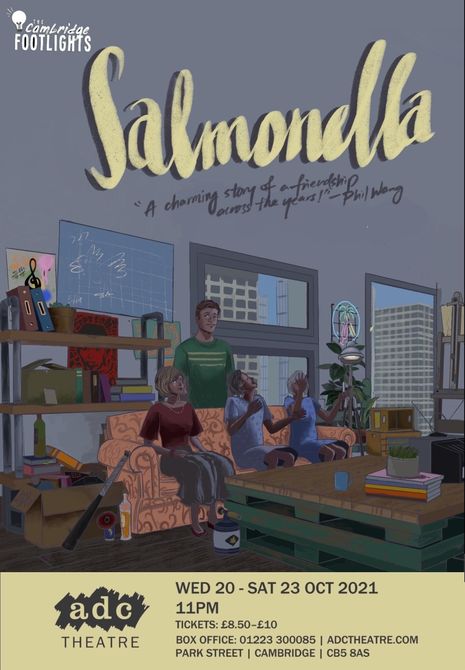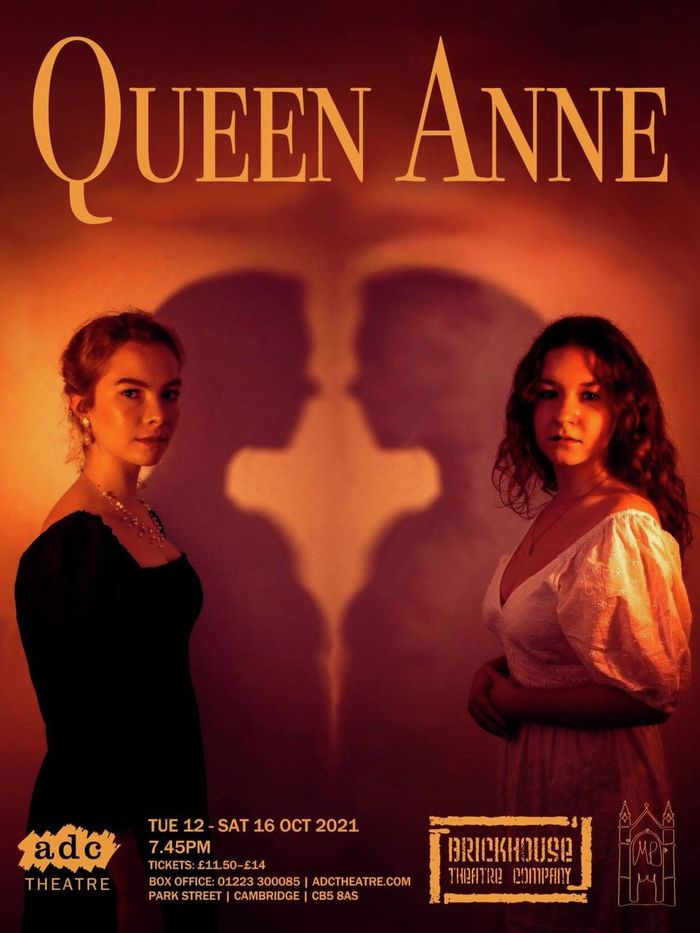Salmonella: ‘Gentle, joyful and sincere’
Emma Robinson reviews this week’s ADC late show, Salmonella

You know when there’s a buzzing, but you don’t realise there is until it stops. And then, it not being there is a thing. It’s an absence—when before it would’ve just been nothing. Well, that’s the logic that totally flew over my head when Salmonella started. It felt like the ensemble remained on stage merely for the sake of remaining onstage, just to give the small parts something more to do. But it was more than that. This directorial decision by Maria Pointer—who also wrote the script—was essential…for the space.
This lowkey, low-stakes, lovely script somehow needed to fill an auditorium and stage that was possibly too big for it. And it managed this by filling the, essentially bare, stage with people, and their energised, if perhaps at times over-the-top, facial expressions, and so with a buzz (in the vein of the show, pun very much intended). The ensemble helped create the vivacity and performative-ness of young adulthood. This was carried along by Callum Bruce’s lighting design, that lent on hot pink, and a playlist of classic pop. And I will always admire the ensembles’ capacity to bop without embarrassment.
Then, when they all disappear, when only one person is left on the stage, you can feel its emptiness. You feel that everyone is gone because they’re gone. It’s a simple play, not telling you anything you didn’t already know, but, sometimes, showing you things you don’t want to face.
Having so many people onstage did compromise the chance to have intimate scenes between the titular friends. But that was sort of the great thing about their friendship: they were light-hearted, and friends because they genuinely just liked each other, without the need for any shared trauma. And I admire Maria Pointer for writing that. For not needing to delve into a backstory. For not needing a script with weight, because, let’s be honest, sometimes those plays just drag their weight behind them.
“they are just a joyful pairing, bouncing off one another”
The Young Sam and Ella, performed by Josh Bailey and Meg Reynolds, have a lovely sense of ease with one another, which enables them to properly commit to making a fool of themselves, without the audience suffering from second-hand embarrassment. They are just a joyful pairing, bouncing off one another.
Josh Bailey gives a unique energy to his part, one which is both chaotically over-brimming and focussed. His delivery is always intentional and grounded, and while the character is evidently a ‘class-clown’, there is never a sense that Sam’s audience spreads beyond Ella and his friends to become Josh’s audience in the auditorium.
Running alongside, rather than interchanging with, the unfolding scenes of Young Sam and Ella’s everyday life, is the mellowed but still joyous setting of the old people’s home, where Old Sam and Ella reside. While Theo Tompkins and Jemima Langdon, as Old Sam and Ella, sit at opposites sides of the stage, they are not distant from one another. Instead, the unfolding memories which fill the space between them is what connects them.
While Callum Bruce singles Old Sam and Ella out with spots, they can often drift out of our attention as they exist on the peripheries of the stage. However, every time my gaze did refix on them, the performers had retained an intent focus. The enduring pride which Sam felt at a joke which wasn’t even funny at the time is beyond endearing. Also, the rawness of some memories is still felt, and we can see how even in close friendships some things always go unspoken, as Theo evades Jemima’s sympathetic gaze. Their incorporation is not merely to juxtapose the energy of young adulthood, nor to signpost the movement of the play, it is to give significance to the main narrative.
The roles assigned to the ensemble were, perhaps, the most demanding of the play. Sam and Ella were inevitably going to be likeable. These smaller roles, however, remain superficial in the script. They are caricatures, because, in Sam and Ella’s memories they are jokes and fleeting memories—anecdotes. Jemima Langdon has an elevating laugh, she lifts up the humour, because she performs Old Ella as sincerely finding herself funny. The minor characters, however, aren’t telling jokes, they are a joke, and we’re meant to laugh at them, not with them. This less natural humour, one that needs to be externally validated, is difficult to achieve, and too often it felt as though it lent on the crutch of exaggeration, to its own detriment.
Salmonella is a gentle and joyful movement through a universal story, which achieves at times a moving sincerity. It’s a beautiful and warming way to spend an evening.
 News / Judge Business School advisor resigns over Epstein and Andrew links18 February 2026
News / Judge Business School advisor resigns over Epstein and Andrew links18 February 2026 News / Hundreds of Cambridge academics demand vote on fate of vet course20 February 2026
News / Hundreds of Cambridge academics demand vote on fate of vet course20 February 2026 News / Petition demands University reverse decision on vegan menu20 February 2026
News / Petition demands University reverse decision on vegan menu20 February 2026 News / CUCA members attend Reform rally in London20 February 2026
News / CUCA members attend Reform rally in London20 February 2026 News / Gov grants £36m to Cambridge supercomputer17 February 2026
News / Gov grants £36m to Cambridge supercomputer17 February 2026










